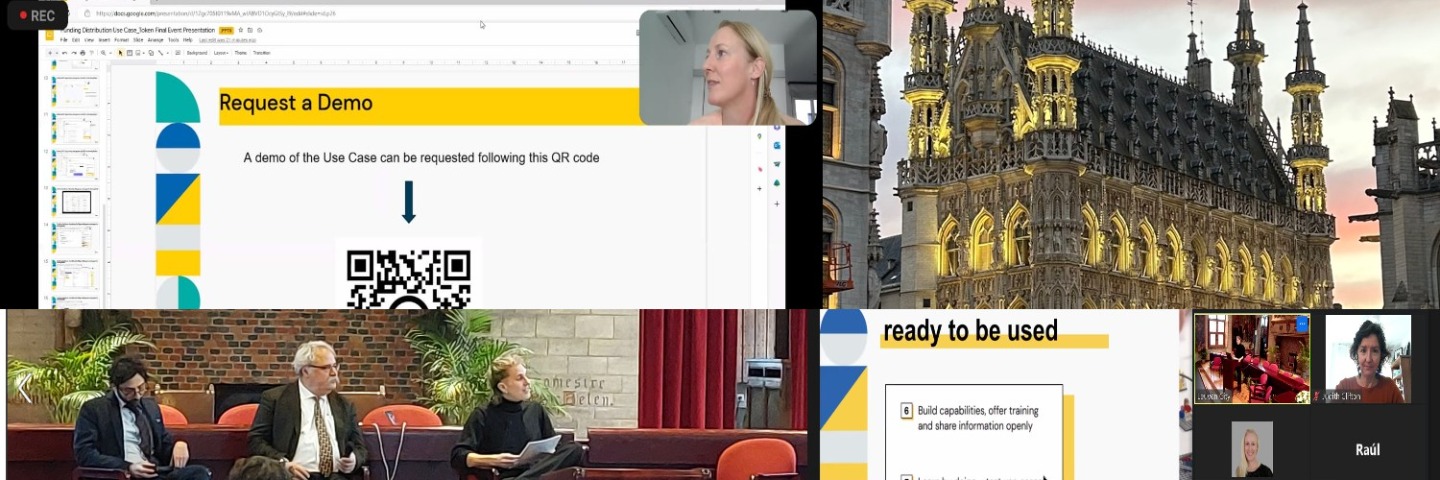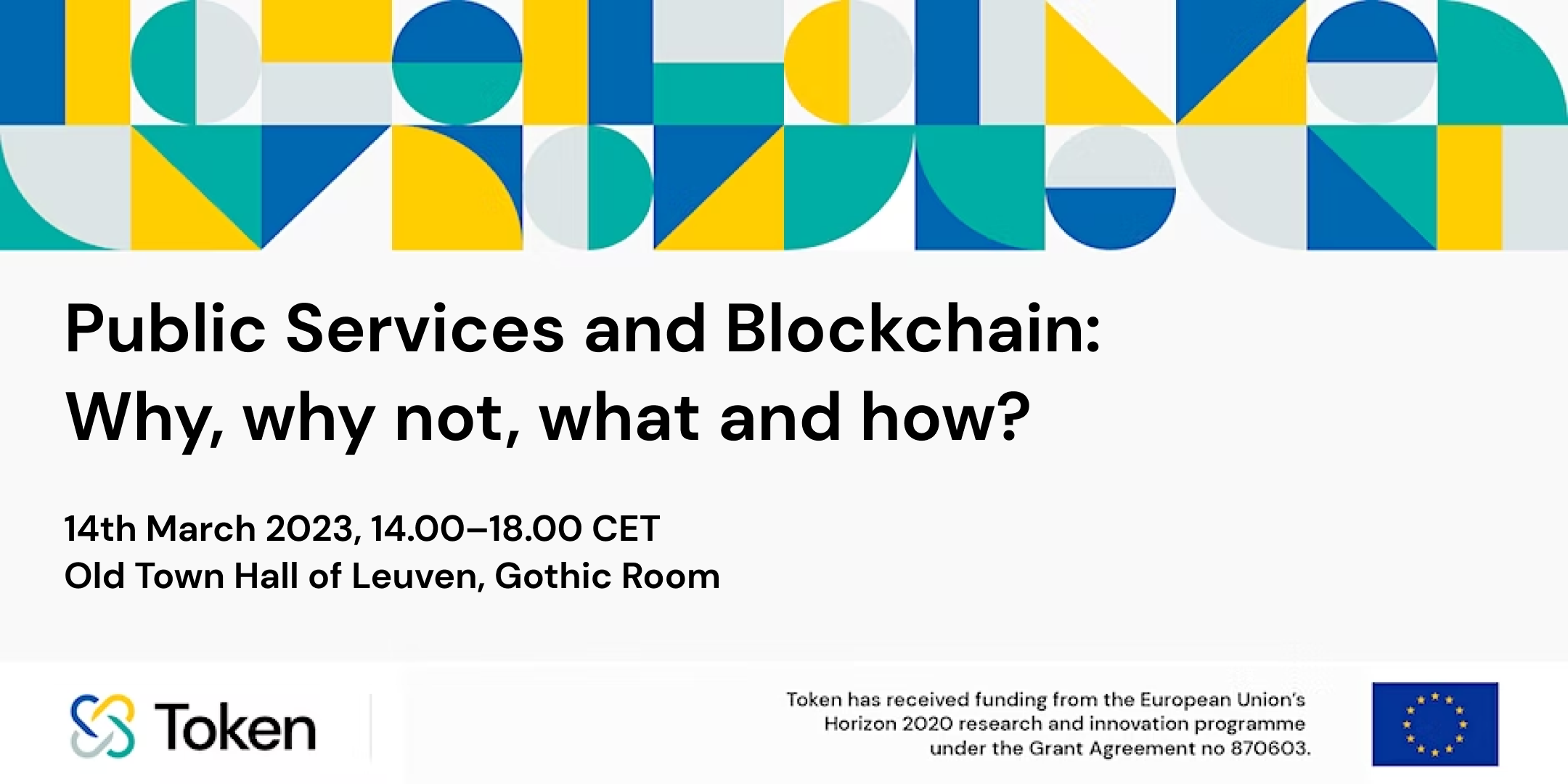Event recap from the TOKEN Final event, held on 14th of March 2023 online and in Leuven.
The TOKEN project, a 3-year initiative aimed at exploring the potential of distributed ledger technologies (DLTs) in public services, culminated in a final event held on March 14, 2023. The event brought together policymakers, researchers, developers, and public officials to share learnings from real-life use cases and discuss the potential of DLTs in public services.

Briefly about the event
- The event began with opening words from Thomas Van Oppens, Deputy Mayor, City of Leuven and followed with a welcome from Stefano de Panfilis, the Chief Operations Officer of the FIWARE Foundation and the consortium lead of TOKEN, who spoke about the transformative impact of DLTs in the public sector.
- This was followed by a presentation from Pierre Marro, a Policy Officer for Digital Innovation and Blockchain at the European Commission, who discussed the current state of DLT development and policy in Europe, especially from the point of view of EBSI and its next steps.
Illustrating honest lessons through 4 concrete DLT use cases
The highlight of the event was the presentation of the four use cases that the TOKEN project had worked on over the past three years. These use cases include:
- Transparent Management of Public Accounts,
- Public Funding Distribution,
- Urban Logistics, and
- Data Valorization Services.
The presenters shared the honest lessons they learned from their use cases highlighting important considerations such as:
- User-friendly approach right from the “defining the problem to be solved” -phase
- Multi-stakeholder approach: complex problems such as urban logistics tend to involve multiple stakeholders and solutions benefit of critical multi-perspective discussion
- Fast iteration cycles
- The benefits of Including a commercial party from the start
- Nor relying on blockchain “buzz” to keep people involved
- Monitoring the evolving legal framework around distributed technologies
After use case -discussion Johannes Anttila, Senior Policy Expert at Demos Helsinki, presented the policy recommendations developed by the TOKEN Policy Observatory: what to take account when building meaningful and inclusive DLT-projects in the public sector. Judith Clifton, Professor in Economic and Public Policy at the University of Cantabria, presented a toolkit for policymakers that has been developed during the TOKEN project and helps policy makers identify and tackle typical challenges related to blockchain projects in the public sector. The toolkit was commented on by Tim Asperges, Mobility Adviser at the City of Leuven, who affirmed that one of the most valuable lessons for Leuven in participating in one of the TOKEN Use Cases was the ability to go beyond silos in administration. The toolkit, as well as the collected learnings from the TOKEN Policy Observatory will be available on the TOKEN project website at the end of March 2023.
Discussing the future of DLTs through a panel discussion
The event also included deep dive discussions with participants and it concluded with a panel discussion on the future of DLTs in the European public sector, where panelists discussed the impact of DLTs, scaling use cases, and the next steps of common infrastructure. The panelists included Lynda O’Mahoney, Project Manager at FundingBox, José Manuel Panizo, an IT Product Officer at the European Commission, Giorgio Costantino, a Project Adviser at Inclusive Society, Future Society at the European Commission, and Stefano de Panfilis. The panel highlighted the importance of not focusing solely on technology but put the needs of the citizen to the core of technology projects. The lessons from TOKEN are valuable in the future pilots of EBSI as well as more broadly bringing in a human-centered perspective to DLT projects in the public sector.
Key takeaways from the event:
- There is the need for continued exploration and development of DLTs in the public sector, the importance of collaboration between policymakers, researchers, developers, and public officials to ensure successful implementation of DLTs. The cases benefit of multi-perspective collaboration including critical voices.
- Policymakers need tools and methods to guide the development and deployment of DLTs in public services.
- DLTS include the potential to bring transparency, efficiency, and security to public services, but the focus needs to be on the specific needs and challenges of different use cases – ultimately, the technology doesn’t matter as much as the value it can bring. Defining this requires broad input from different stakeholders, with citizens and users being drawn by the benefits the technology can bring.
In conclusion, the TOKEN project’s final event provided a valuable opportunity to share learnings and insights from real-life use cases of DLTs in public services, and to discuss the potential of DLTs in the wider European landscape. It highlighted the need for continued collaboration and development to ensure successful implementation of DLTs in public services and beyond.
A huge thanks to all of those present online and in Leuven – the speakers as well as our wonderful participants who were engaged in the discussion. The warmest of thanks also to the City of Leuven for their hospitality and help.
Do get in touch if you want to continue the discussions or hear more about the results from the TOKEN project!

